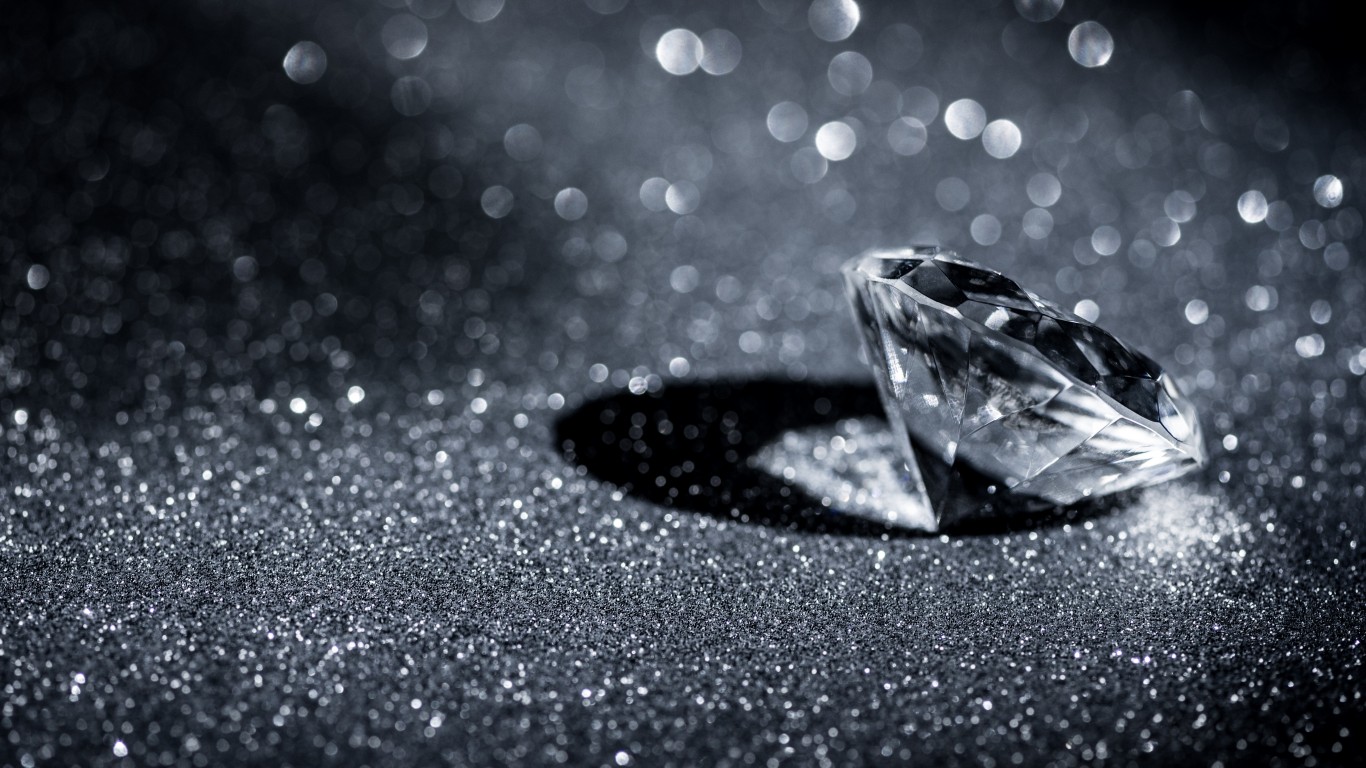
People have been mining for diamonds for more than 2,000 years. The sparkling stones have always been rare, and while size isn’t necessarily a determinant of quality, large diamonds have always held a particular fascination. Modern technology has helped recover some of the largest diamonds ever, which is probably why seven of the 15 stones on our list were discovered in the 21st century. (Diamonds, of course, are one of the most expensive materials on Earth.)
To compile a list of the15 biggest diamonds ever discovered, 24/7 Tempo consulted the websites of the Cape Town Diamond Museum, Geology.Com, and several high-end jewelry retailers. Diamonds are ranked by their pre-cut weight in carats. Both gem-quality and non-gem-quality diamonds are included. Many of these diamonds were later cut into some of the largest gems on Earth. Several of the more recent diamonds discovered are unnamed.
The “black diamond” called the Carbonado do Sergio, discovered in 1895 in Brazil’s Bahia State, is sometimes named as the world’s biggest diamond (it weighed in at 3,167 carats, or 22.3 ounces), but according to the International Gem Society, it isn’t really a diamond, but is “more accurately described as a polycrystalline or aggregate diamond material of amorphous carbon, graphite, and diamond” – so it is not included here.
All but one of the stones on this list were found in Africa, and specifically in the countries of Botswana (six), South Africa (three), Sierra Leone (two), the Democratic Republic of Congo (two), and Lesotho (one). A single Botswana location, the Karowe Mine, has yielded five of that country’s six. The single outlier, the fabled Kooh-i-Noor Diamond, was found in the 13th century in India – the first place on earth where diamonds were mined. (See which African nations are among the countries with the worst wealth inequality.)
The Canadian-based Lucara Diamond Corp. operates the Karowe Mine, and an important factor in its success at locating large stones is its use of X-Ray transmission (XRT), which Lucara began utilizing in 2015. This has enabled Lucara to recover 33 stones more than 100 carats. The technology measures the ore’s atomic density to identify diamonds at earlier stages, allowing recoveries of larger stones.
Click here for more about the 15 biggest diamonds ever discovered
While African countries have long been the most prolific source of diamonds, mining there is burdened with racial baggage because indigenous peoples were exploited and worked to extremes in colonial times. A concern today is the sale of so-called blood (or conflict) diamonds, mined in war zones and sold to support rebel groups or terrorists. Various international attempts to stem the flow of such diamonds into the marketplace have met with mixed results.
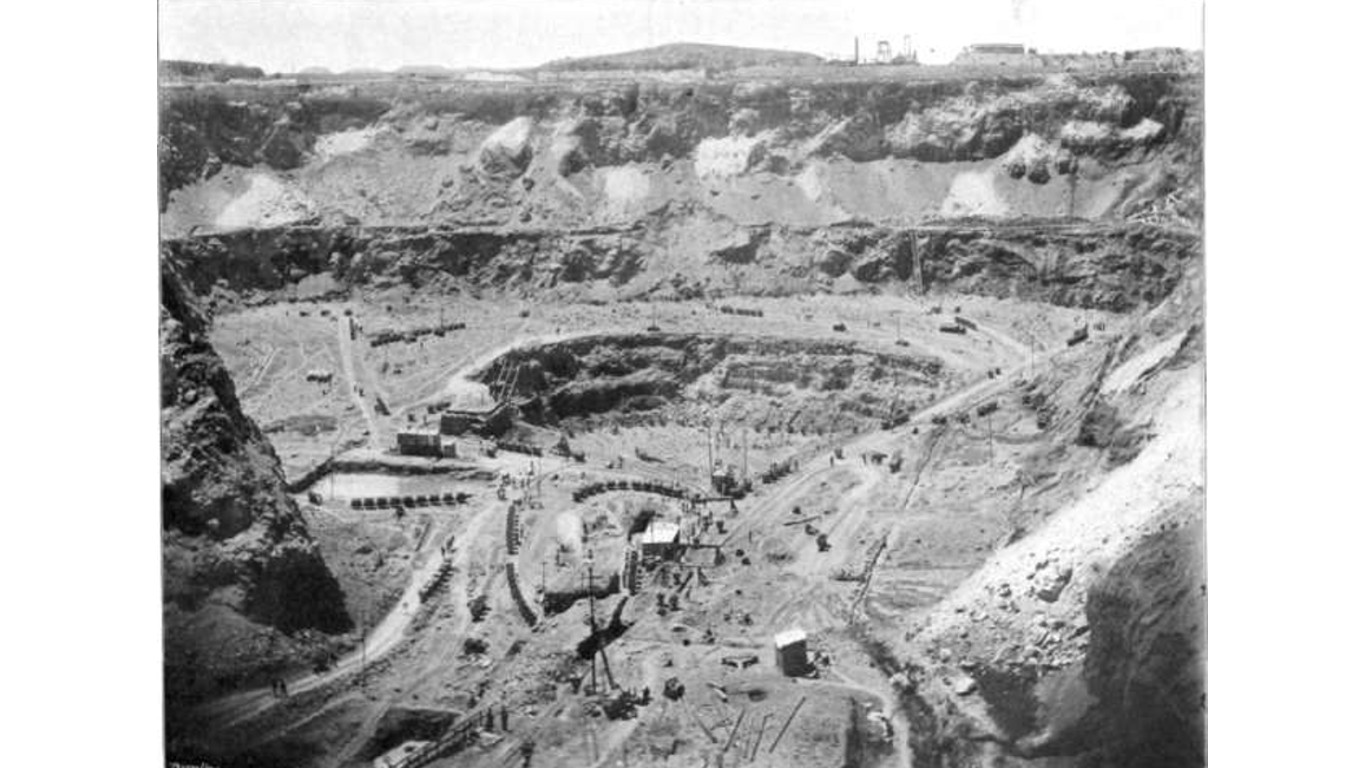
15. Golden Jubilee Diamond
> Weight: 755.50 carats (5.3 oz)
> Mine found: Premier Mine, Cullinan, South Africa
> When: 1985
Discovered at the same South African mine that yielded the spectacular Cullinan Diamond (see No. 1) 80 years earlier, the diamond that became known as the Golden Jubilee was only the 15th largest stone found in the rough state, but it was turned into the world’s largest cut and faceted diamond. Blessed by Pope John II, it was bought by a group of Thai businessmen in 1995 and presented to King Bhumibol Adulyadej in observance of the 50th anniversary of his coronation as Thailand’s ruler.
[in-text-ad]
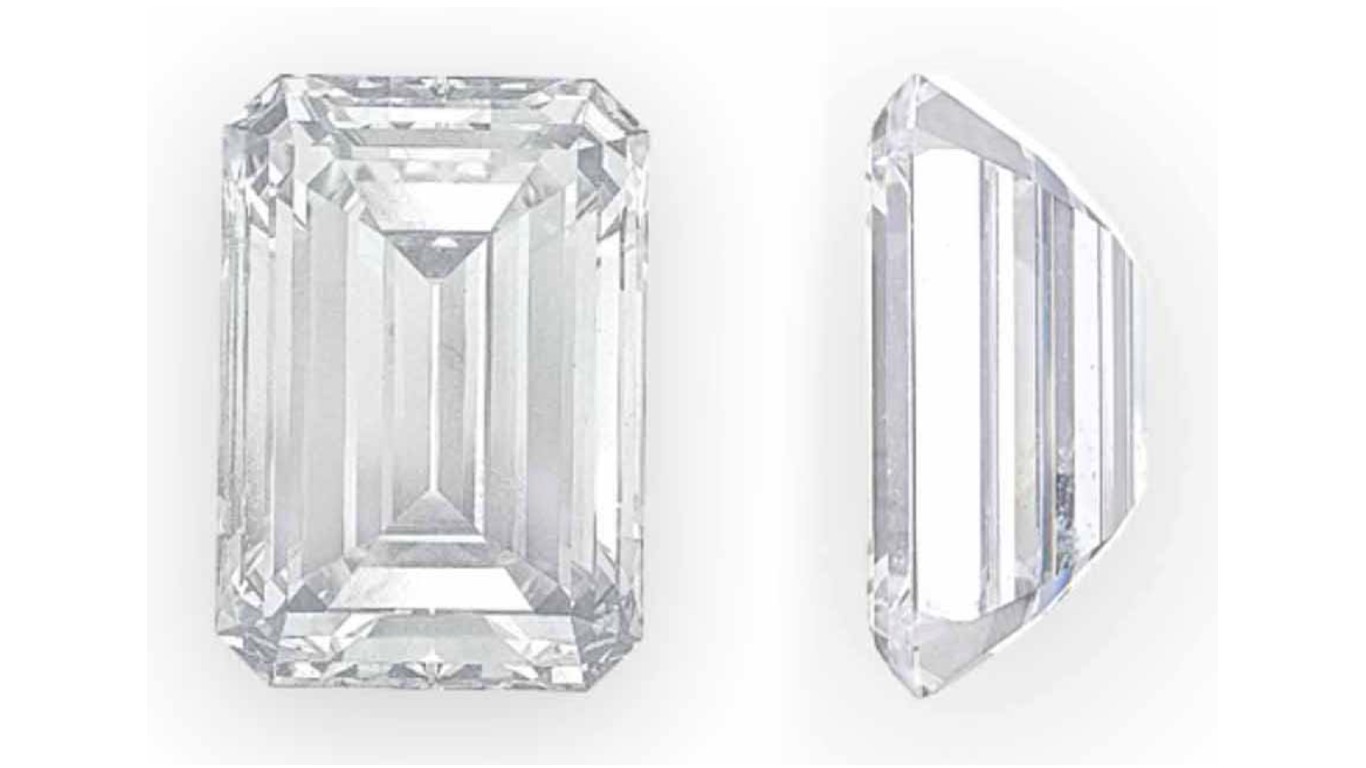
14. Woyie River Diamond
> Weight: 770 carats (5.4 oz)
> Mine found: near Koidu, Sierra Leone
> When: 1945
The Woyie River Diamond was the largest alluvial diamond ever found at the time of its discovery. In 1953, the diamond was cut into 30 gems by the London firm Briefel and Lemer.
The largest of these is a D-color 31.34-carat stone named the Victory Diamond in celebration of the Allied victory in World War II. The emerald-cut diamond, which had belonged to arts patron Florence Gould, sold for $4.3 million at Christies in 2015.

13. Millennium Star Diamond
> Weight: 777 carats (5.5 oz)
> Mine found: Mbuji-Mayi , Democratic Republic of Congo
> When: 1990
The Millennium Star Diamond is the second-largest colorless stone with the highest color rating of D in the world. It was bought by the major diamond mining and retail consortium De Beers and cut by the Steinmetz Group to create a 203.04-carat, D-Flawless pear-shaped diamond. It was unveiled in 1999 as part of the De Beers Millennium Diamond Collection and displayed at the Millennium Dome in London. London police thwarted an attempt to steal the collection in November 2000. The Millennium Star is estimated to be worth more than $40 million.
12. Koh-i-Noor
> Weight: 793 carats (5.6 oz)
> Mine found: Kollur Mine, India
> When: 13th century
A lot of blood has been spilled over the Koh-i-Noor Diamond. Reportedly discovered in the Kollur Mine, a series of gravel-clay pits now submerged by the Krishna River in the Indian state of Andhra Pradesh, it was the possession of the ruling Kakatiya dynasty for many years and passed through the hands of Sikh, Mughal, and Persian rulers. In 1849, the British obtained the diamond after the Second Anglo-Sikh War. In 1852, Prince Albert ordered that the diamond be cut, resulting in a 186-carat oval-cut diamond. The diamond is the property of the British crown 174 years later.
[in-text-ad-2]
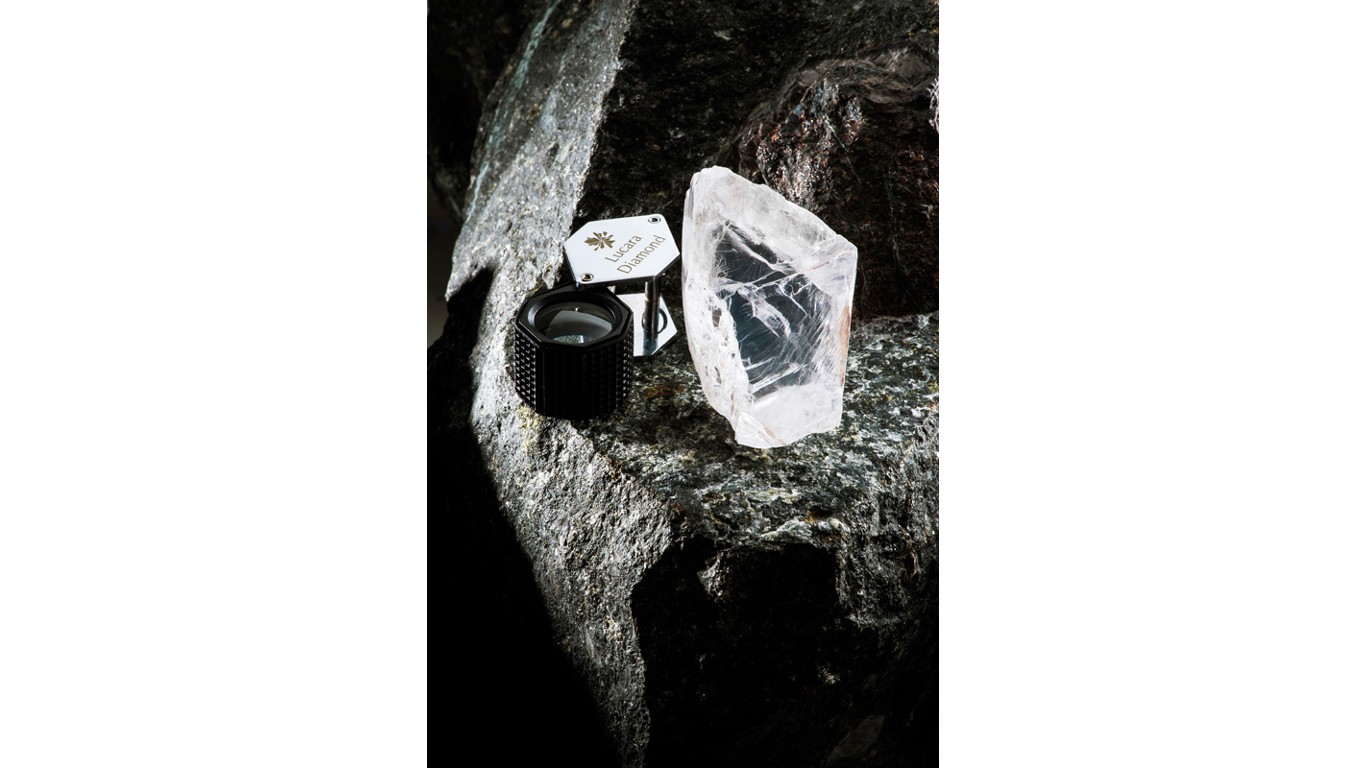
11. Constellation Diamond
> Weight: 813 carats (5.7 oz)
> Mine found: Karowe Mine, Botswana
> When: 2015
The year 2015 would prove to be an important one for the Lucara Diamond Corp. and the Karowe Mine in Botswana. That is when the Canadian mining company started using a new X-ray transmission sorting equipment to discover diamonds. The 813-carat Constellation diamond was found in the same year and mine where the Lesedi La Rona Diamond (see No. 5) was found. The Constellation was bought by De Beers, which sold it to Zale Corp. In 2016, the Dubai-based firm Nemesis International DMCC purchased it for a record $63.1 million, making the diamond worth $77,649 per carat.
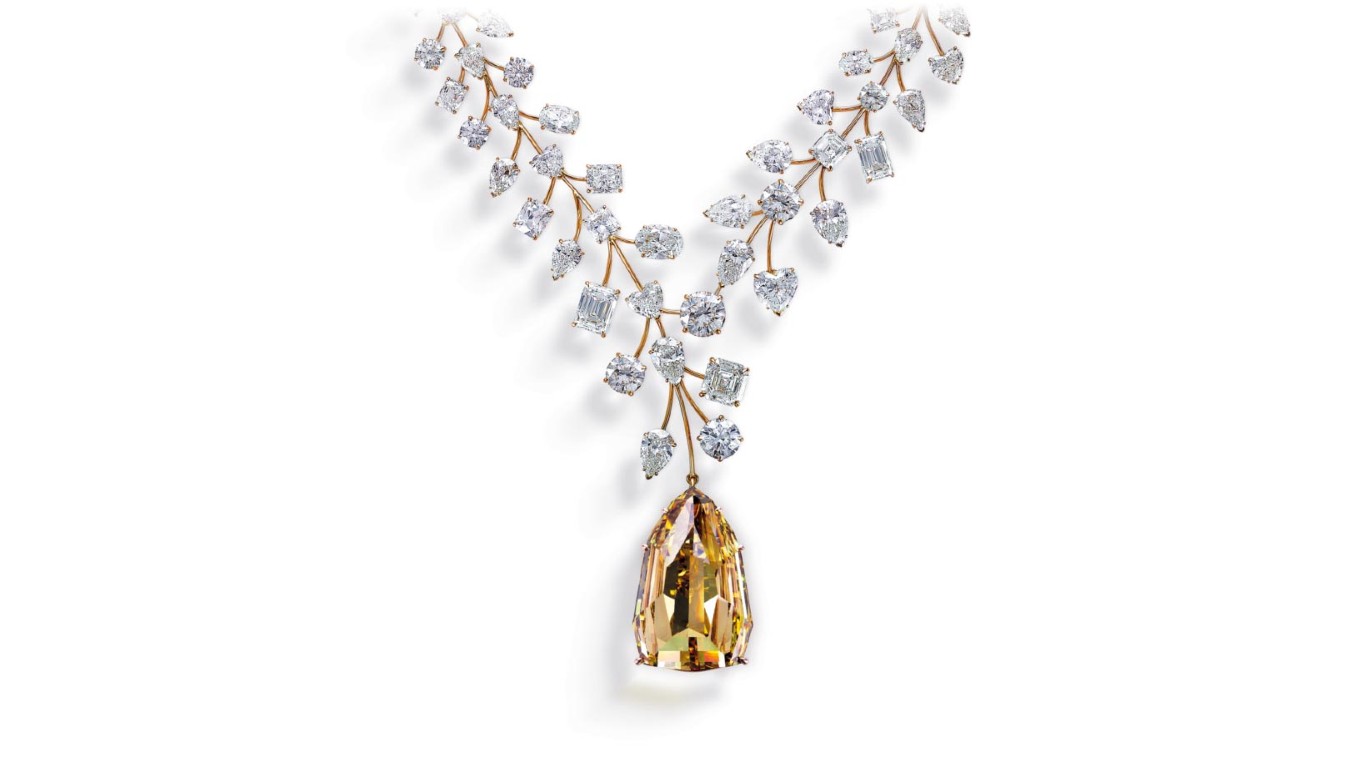
10. Incomparable Diamond
> Weight: 890 carats (6.3 oz)
> Mine found: MIBA Diamond Mine, Democratic Republic of the Congo
> When: 1989
Some diamonds are found by accident. In 1989, a girl looking through the mine tailings of the MIBA Diamond Mine in the Democratic Republic of the Congo noticed a deep brownish yellow diamond weighing 890 carats. It took four years for experts in Antwerp, Belgium, to analyze and finally cut the diamond. Cut into a triangular drop weighing 407.38 carats, it was named The Incomparable. In 2013, Mouawad Jewelers set it into a 367-carat diamond necklace that is listed in the Guinness World Records as the world’s most expensive necklace, worth $55 million.
[in-text-ad]
9. Lesotho Legend
> Weight: 910 carats (6.4 oz)
> Mine found: Letseng Mine, Lesotho
> When: 2018
The 910-carat Lesotho Legend was discovered by Gem Diamonds at the Letseng Mine, another diamond mine famous for the size and quality of its diamonds, particularly white diamonds. The mine is one of the highest in the world at 10,000 feet above sea level. The rough diamond sold for $40 million to an unnamed customer in March 2018 but no cut gems have yet been unveiled. Gem Diamonds says it is the largest diamond to have been recovered from the Letseng Mine.
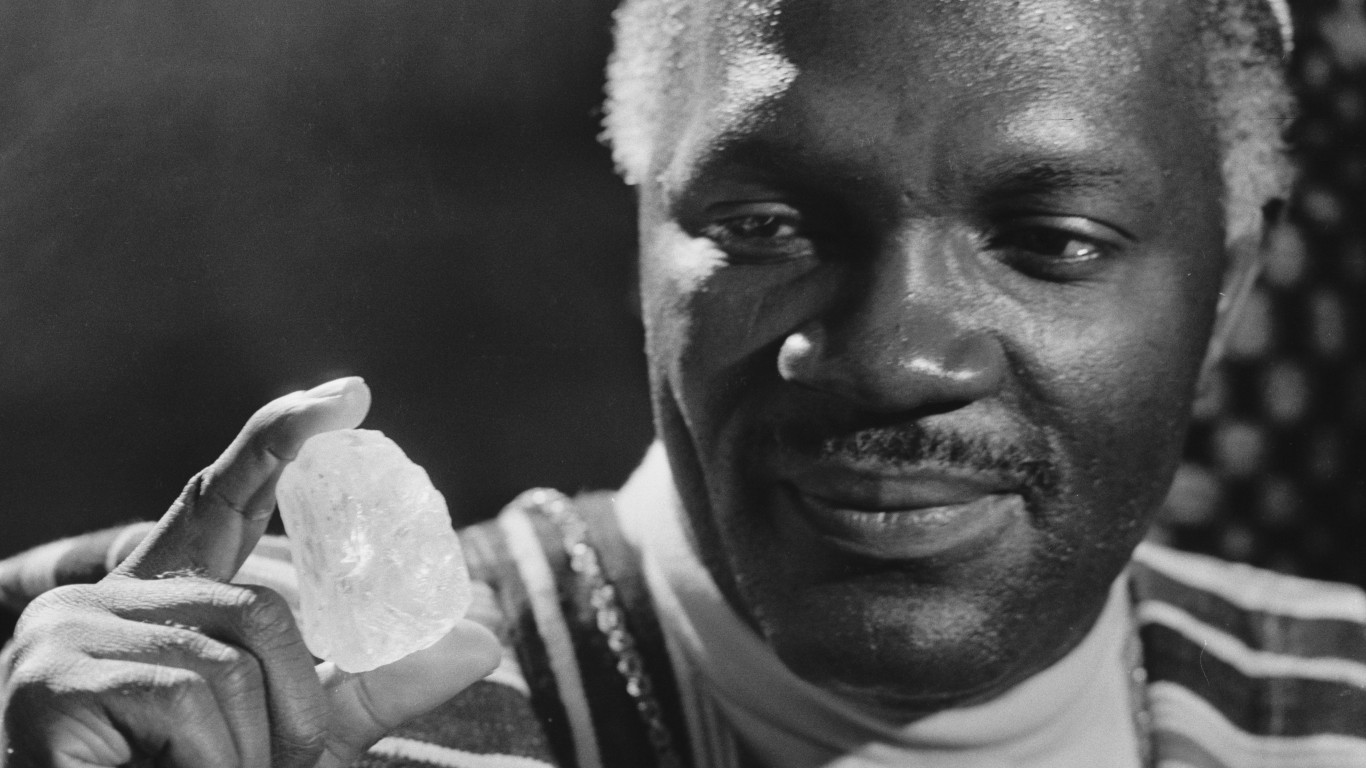
8. Star of Sierra Leone
> Weight: 969 carats (6.8 oz)
> Mine found: Diminco, Sierra Leone
> When: 1972
The Star of Sierra Leone was found on Valentine’s Day in a river near Koidu in Sierra Leone in 1972. It was purchased by Harry Winston and brought to New York. It was initially cut into a 143.20-carat emerald cut but because of a flaw, it was recut into a 42-carat pear shape by New York firm Lazare Kaplan. Another 17 diamonds were produced from the rough stone and six of them were set into a brooch. The Star of Sierra Leone is the largest alluvial diamond ever found; every larger gem has been recovered from a primary deposit. It is likely worth more than $6 million. The famed 770-carat Woyie River diamond also was found near Koidu, in 1945.
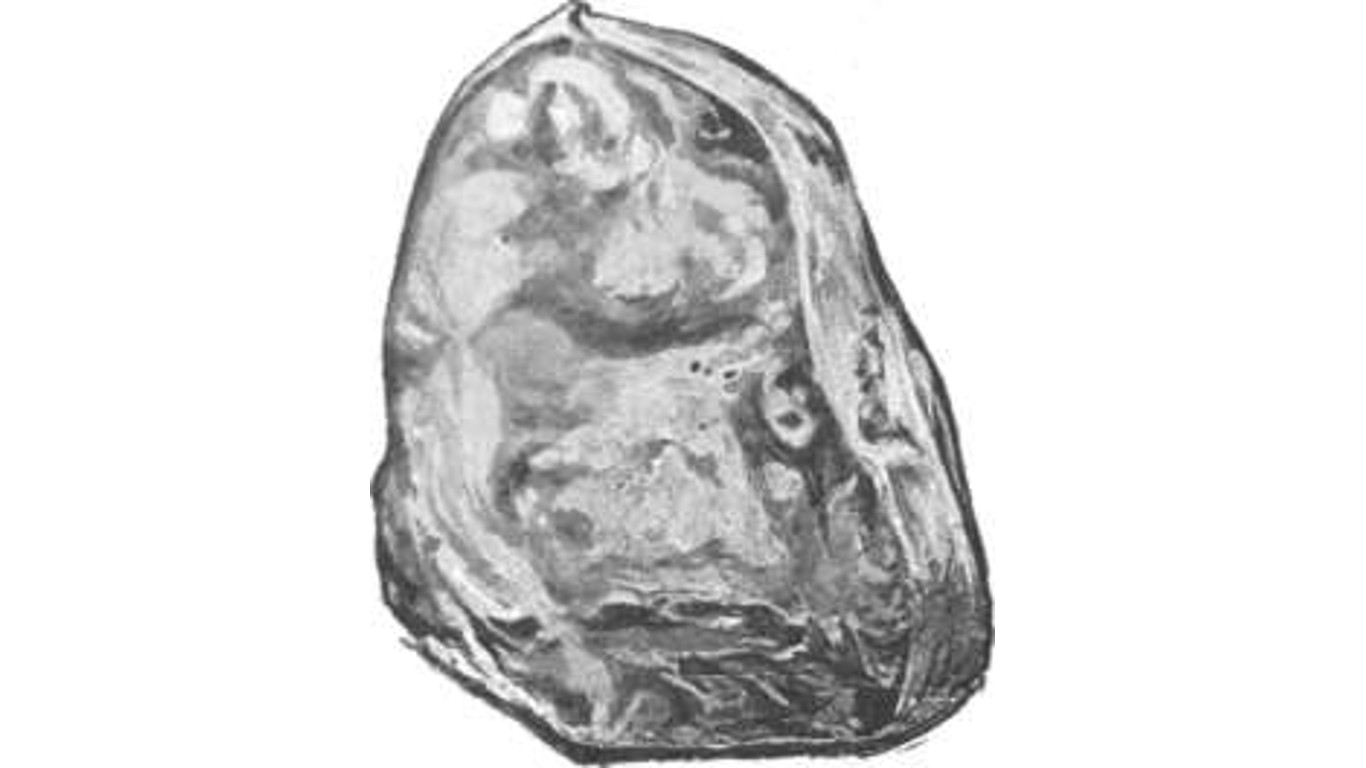
7. Excelsior Diamond
> Weight: 995 carats (7.0 oz)
> Mine found: Jagersfontein Mine, South Africa
> When: 1893
When the 995-carat rough Excelsior Diamond was discovered, it was the largest diamond ever found to that point. It was so large and flawless, no one initially wanted to buy it. It was cut into many small diamonds in 1904 by renowned diamond cutter Joseph Asscher of Amsterdam. The largest of them is a pear-shaped gem weighing 69.69 carats and worth more than $10 million.
[in-text-ad-2]
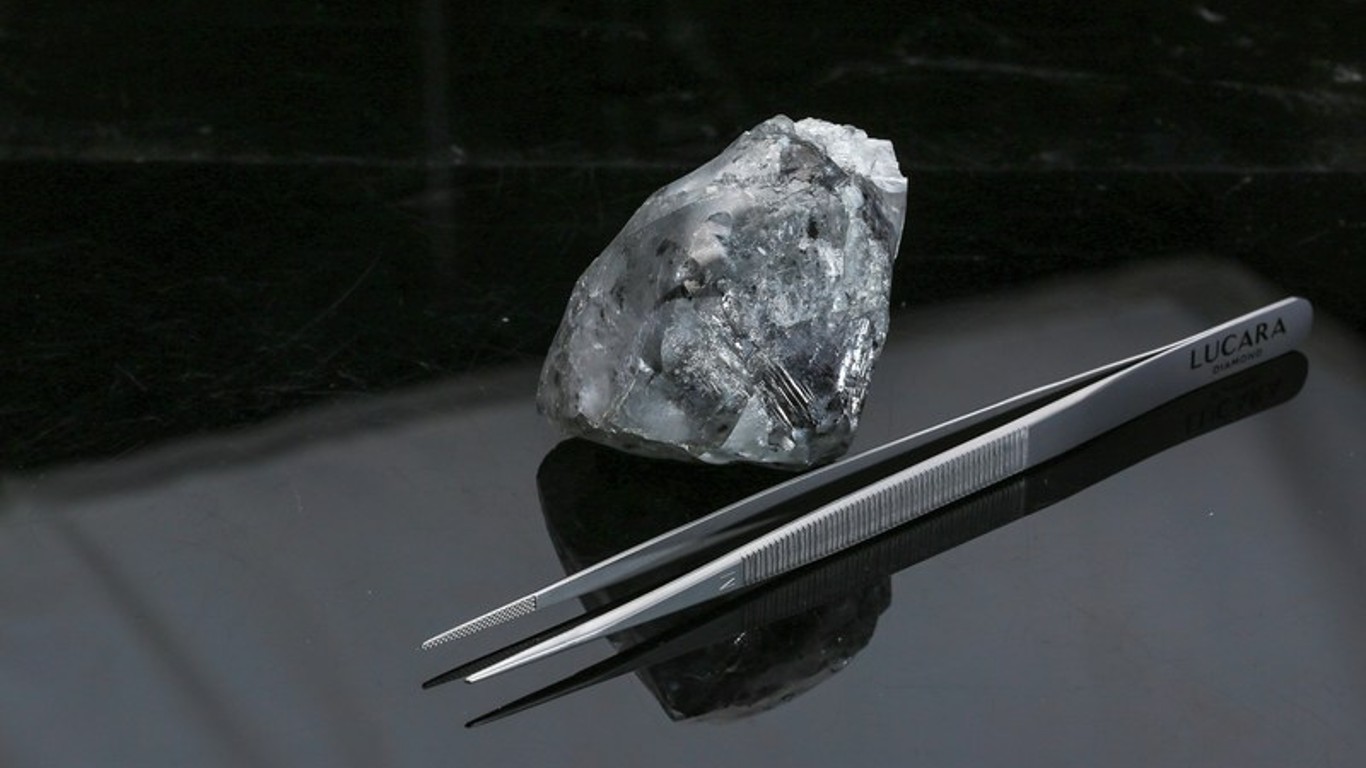
6. Unnamed diamond
> Weight: 998 carats (7.0 oz)
> Mine found: Karowe Mine, Botswana
> When: 2020
A 998-carat rough diamond was discovered in Botswana at the Karowe Mine. It is the latest find made using equipment and technology designed specifically to unearth exceptionally large diamonds. The unnamed gem might be worth $50 million or more, based on the per-carat price fetched by diamonds with similar characteristics. The 998-carat stone was the second 500-plus carat diamond recovered from the mine in 2020. Karowe produced 31 diamonds greater than 100 carats in 2020. The mine’s owner, Lucara, is working with diamond cutting and polishing specialist HB Antwerp to evaluate the next steps in maximizing the value of the rare large stone.
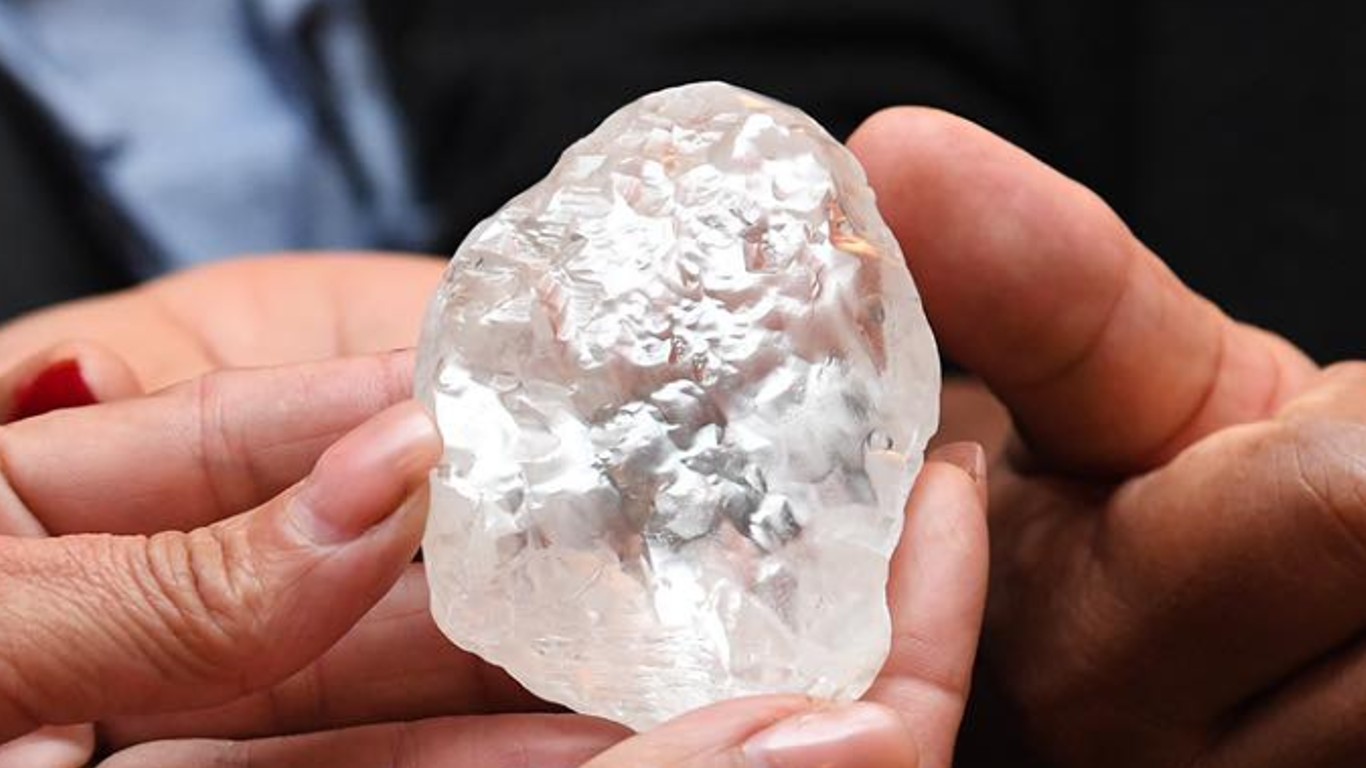
5. Unnamed diamond
> Weight: 1,098 carats (7.7 oz)
> Mine found: Jwaneng Mine, Botswana
> When: 2021
This is one of the most recent major diamond discoveries. Miners at the Jwaneng Mine unearthed a 1,098-carat stone that was presented to President Mokgweetsi Masisi by the Debswana Diamond Co., the mining company jointly owned by the Botswanan government and the De Beers Group. (Diamonds were first discovered in Botswana in 1967 and Debswana was formed in 1969.) The diamond’s discovery is an economic shot in the arm for Botswana, whose economy has been reeling from the impact of the pandemic. Diamonds account for about two-thirds of Botswana’s export earnings.
[in-text-ad]
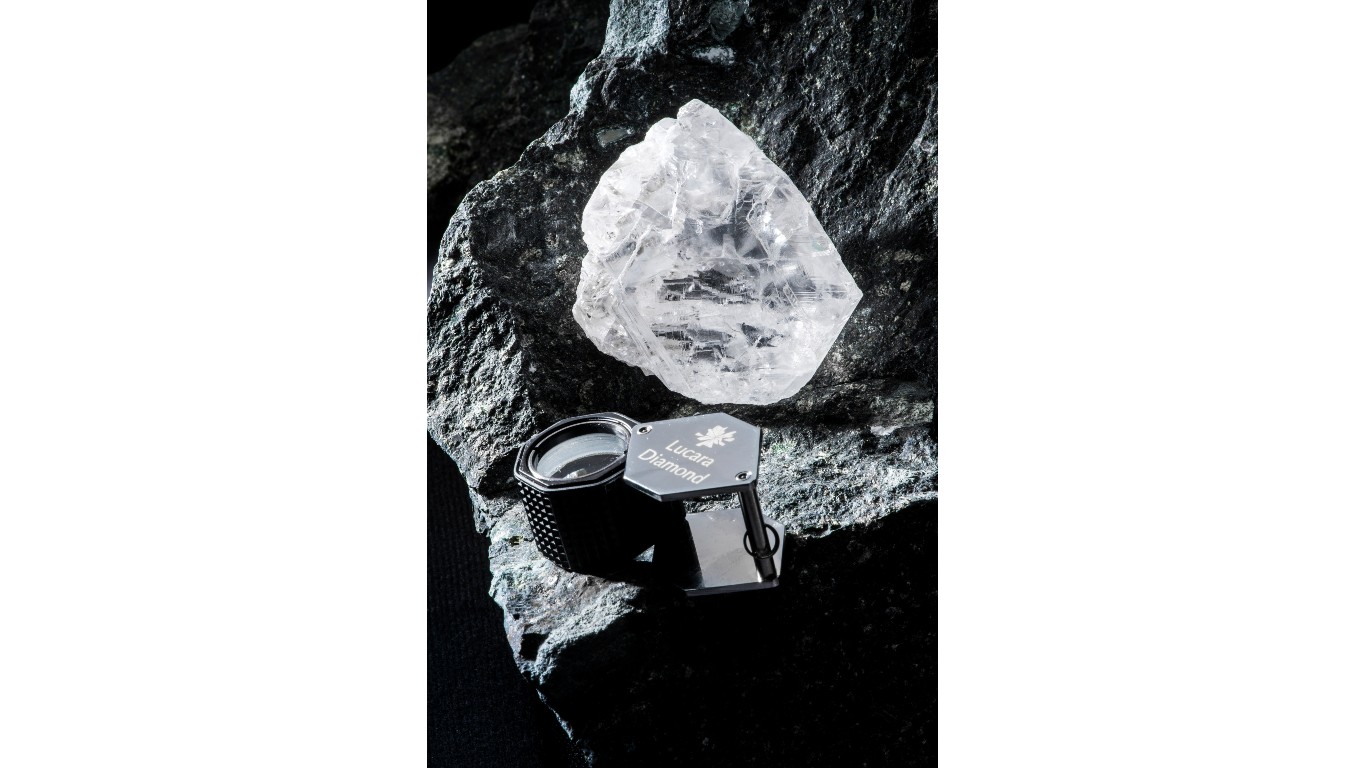
4. Lesedi La Rona
> Weight: 1,109 carats (7.8 oz)
> Mine found: Karowe Mine, Botswana
> When: 2015
Another major find from Botswana’s Karowe Mineis this 1,109-carat rough diamond. Botswana conducted a nationwide naming contest and the winning entry was Lesedi La Rona, which means “our light” in Tswana, the official language of Botswana. It sold for $53 million in September 2017 to Graff Diamonds. The diamond, the size of a tennis ball, was too large for Graff’s equipment, so a scanner was custom built with new imaging software. Graff eventually cut a 302.37-carat square emerald cut diamond – the world’s largest square emerald-cut diamond. The diamond is the largest ever graded by the Gemological Institute of America as being of highest color, D, and highest clarity. The stone also produced 66 smaller diamonds. Fragments from the cutting of the stone were donated to the Smithsonian Institute for research into the Earth’s crust.
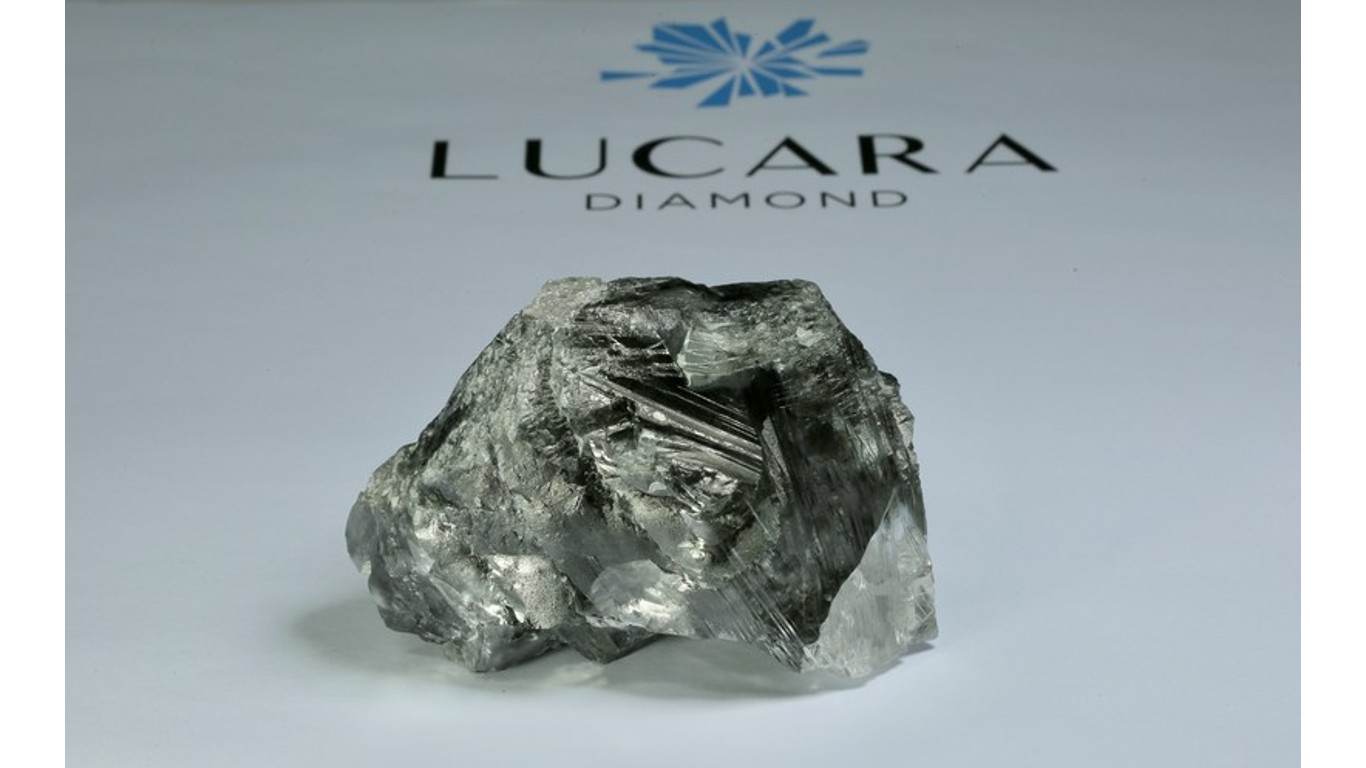
3. Unnamed diamond
> Weight: 1,174 carats (8.3 oz)
> Mine found: Karowe Mine, Botswana
> When: 2021
A 1,174-carat diamond was found at the Karowe Mine in Botswana in July 2021, just weeks after another 1,000-carat plus diamond had been discovered in the African nation. The rare find was presented to the government in a ceremony attended by President Mokgweetsi Masisi. It is the third diamond of more than 1,000 carats found at the site. Lucara Diamond Corp., the Canadian mining company that unearthed the gem, said in a press release that the diamond will be made into “valuable collections of top color polished diamonds.”
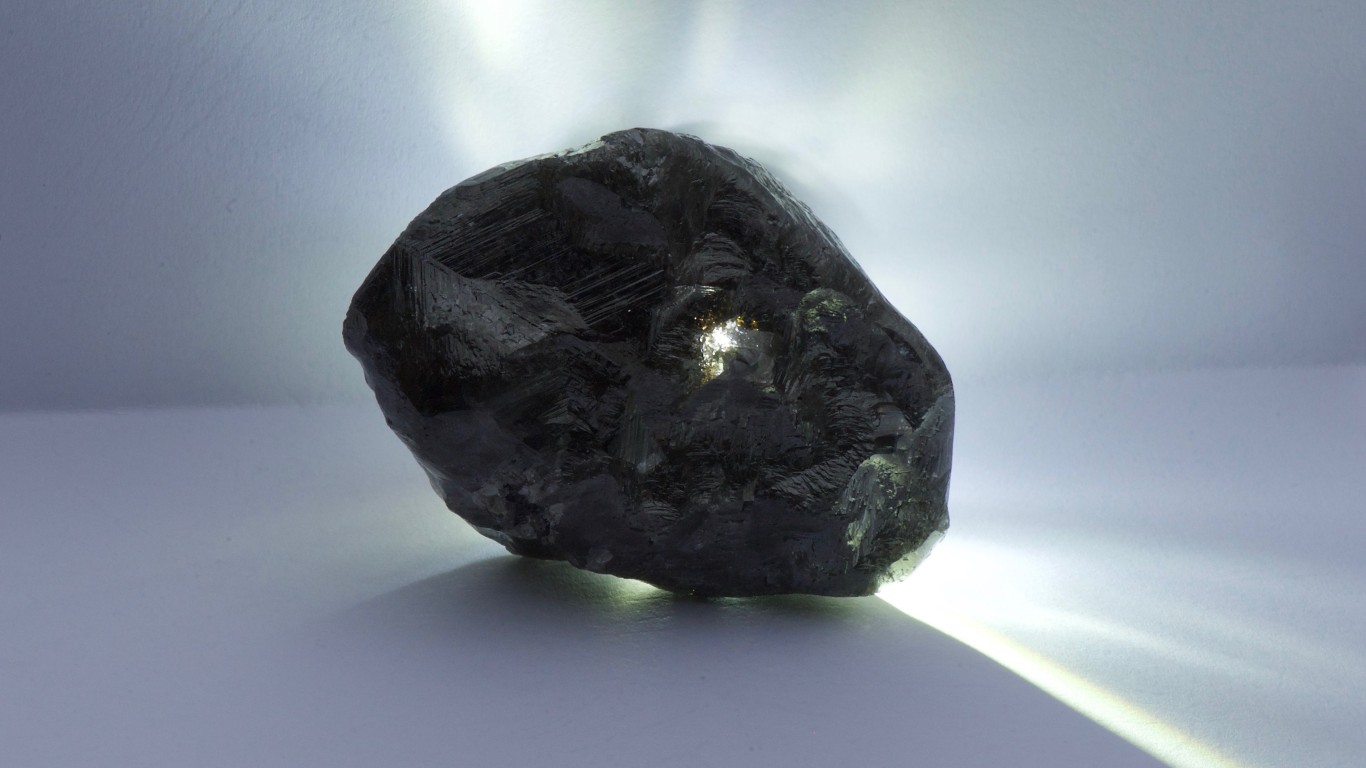
2. Sewelô Diamond
> Weight: 1,758 carats (12.4 oz)
> Mine found: Karowe Mine, Botswana
> When: 2019
This is the largest of the five diamonds on our list to be unearthed at the Karowe Mine in Botswana, at 1,758 carats. Diamond experts are divided on whether it should be on lists like this one because it has been described as “near gem of variable quality.” That means that only parts of the diamond are transparent enough to slice into gems. Because of this, it’s worth a fraction of the value of a gem-quality rough diamond of the same size. The French luxury brand Louis Vuitton bought the stone.
[in-text-ad-2]
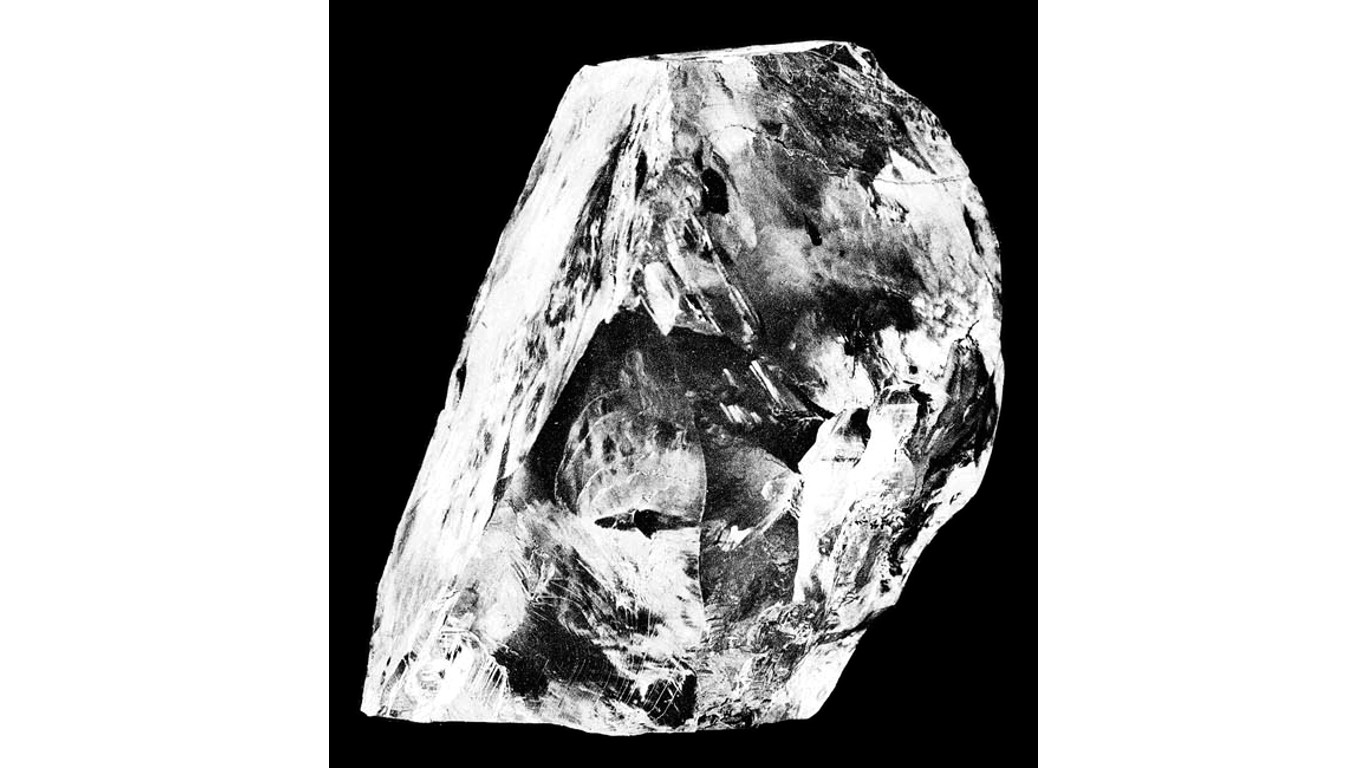
1. Cullinan Diamond
> Weight: 3,106 carats (21.9 oz)
> Mine found: Premier Mine, Cullinan, South Africa
> When: 1905
Frederick Wells, superintendent of the Premier Mine, near Pretoria in Transvaal, found this huge diamond crystal near the surface of the mining pit. At first he didn’t think it could be a diamond. The Cullinan, named after mine owner Thomas Cullinan, was given to King Edward VII of England by the Transvaal government as a pledge of loyalty. It was sent to Amsterdam, where famed diamond cutter Joseph Asscher cleaved it into individual diamonds. Many of these are part of the Crown Jewels of England and displayed in the Tower of London.
The Average American Has No Idea How Much Money You Can Make Today (Sponsor)
The last few years made people forget how much banks and CD’s can pay. Meanwhile, interest rates have spiked and many can afford to pay you much more, but most are keeping yields low and hoping you won’t notice.
But there is good news. To win qualified customers, some accounts are paying almost 10x the national average! That’s an incredible way to keep your money safe and earn more at the same time. Our top pick for high yield savings accounts includes other benefits as well. You can earn up to 3.80% with a Checking & Savings Account today Sign up and get up to $300 with direct deposit. No account fees. FDIC Insured.
Click here to see how much more you could be earning on your savings today. It takes just a few minutes to open an account to make your money work for you.
Our top pick for high yield savings accounts includes other benefits as well. You can earn up to 4.00% with a Checking & Savings Account from Sofi. Sign up and get up to $300 with direct deposit. No account fees. FDIC Insured.
Thank you for reading! Have some feedback for us?
Contact the 24/7 Wall St. editorial team.
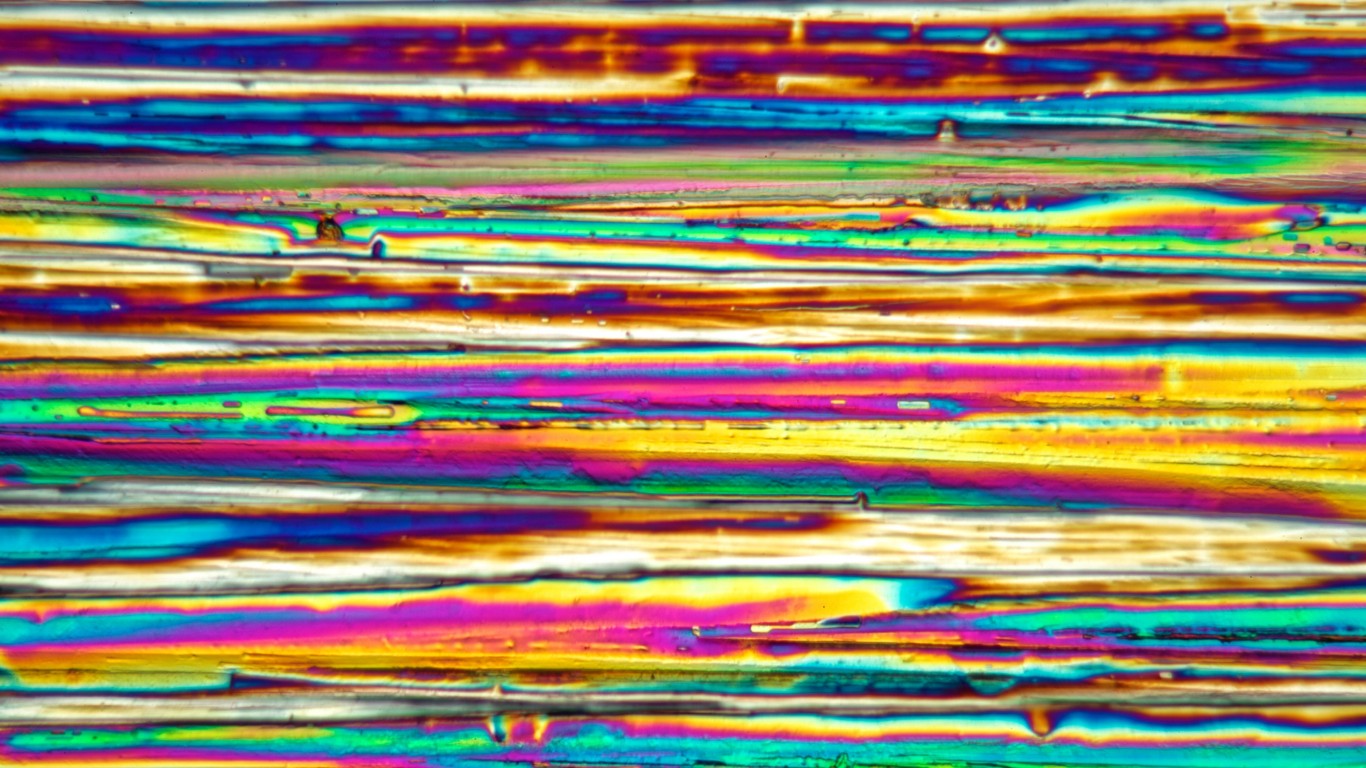 24/7 Wall St.
24/7 Wall St.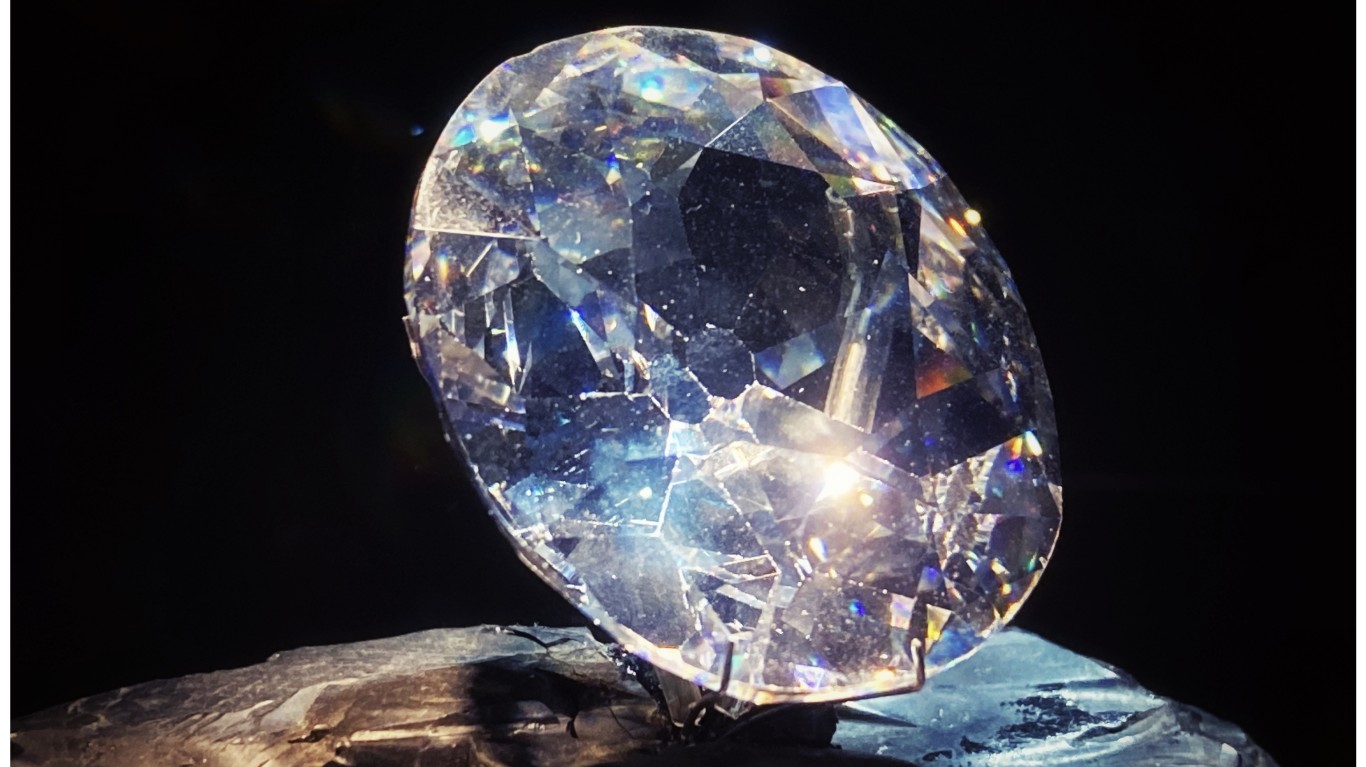
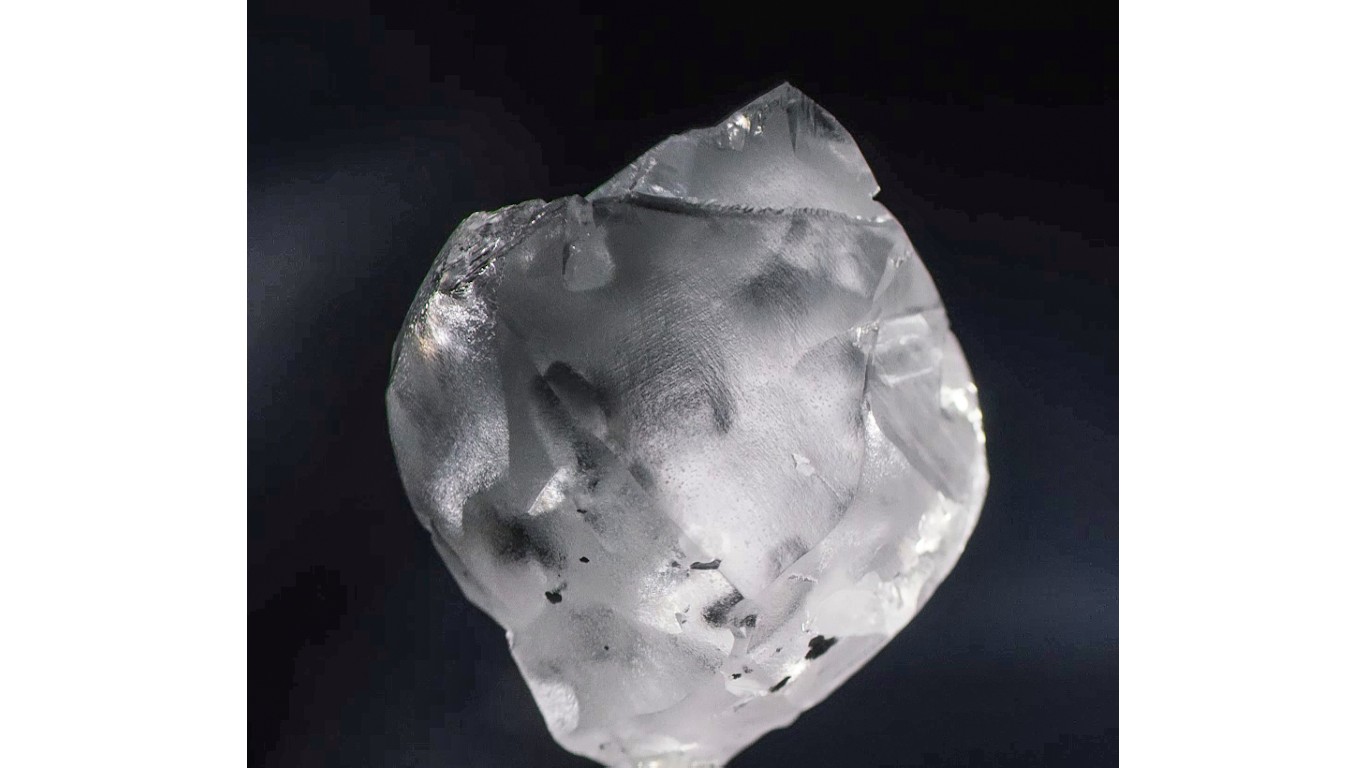
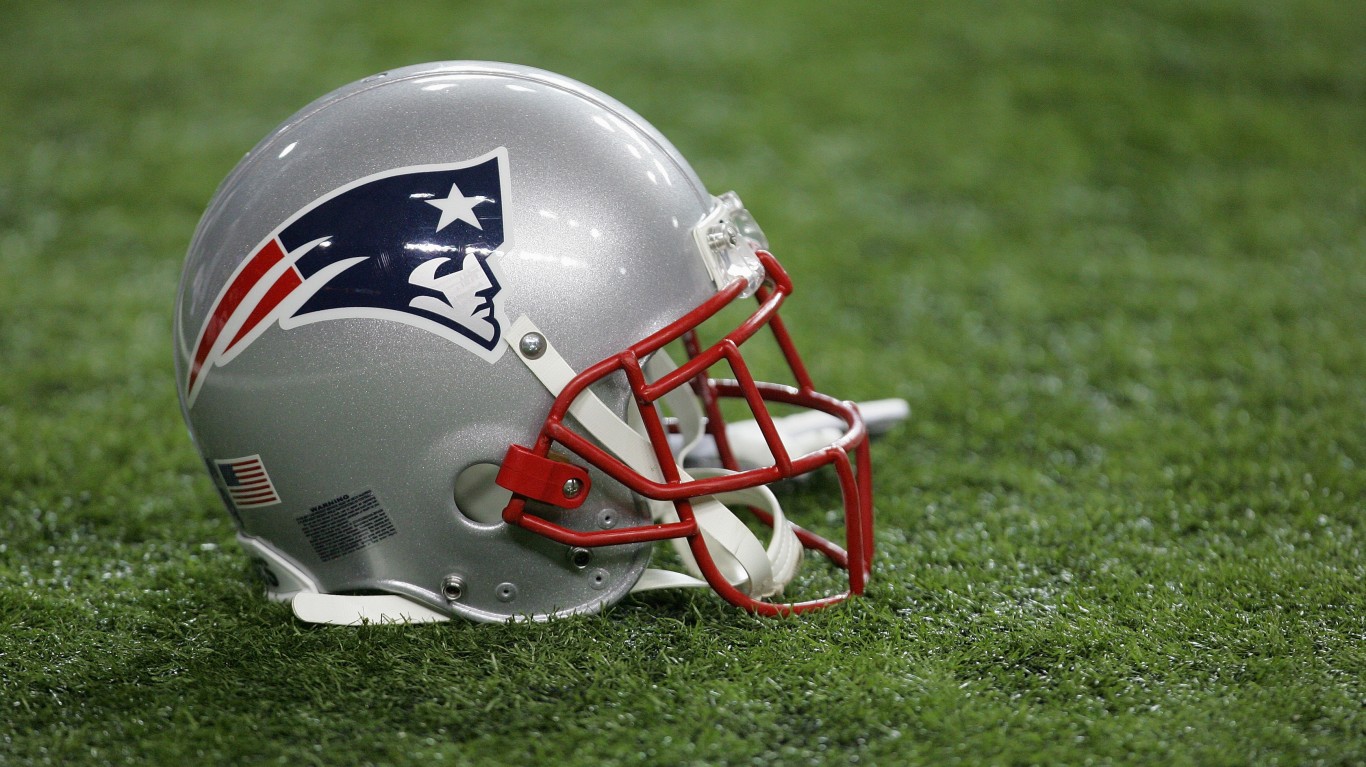 24/7 Wall St.
24/7 Wall St.